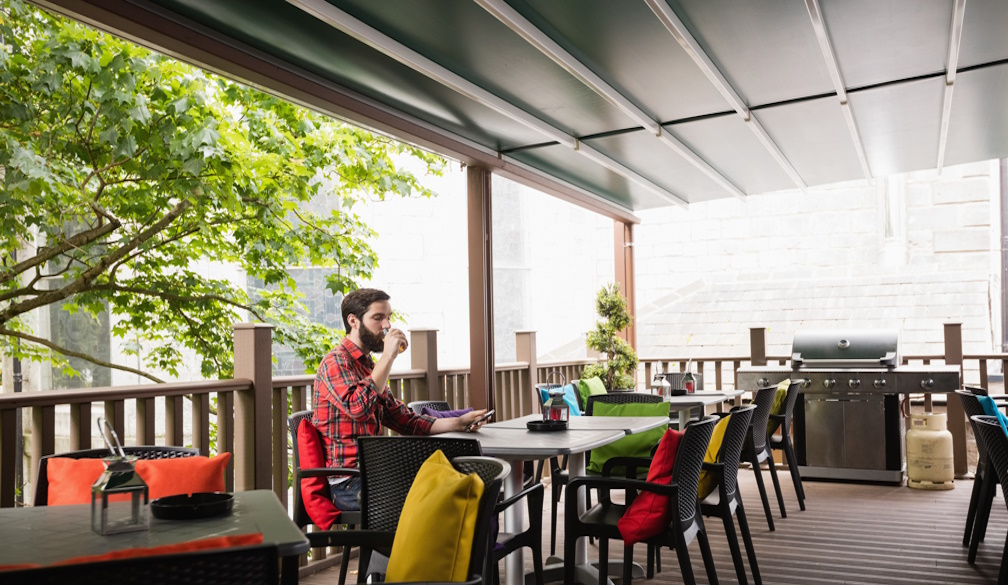Shade Awnings: The Perfect Blend of Comfort, Functionality, and Modern Design

Australia’s love for outdoor living has made shade solutions an essential feature for homes and businesses alike. Whether you’re looking to protect your patio from the sun, create a comfortable outdoor dining area, or add style to your storefront, shade awnings offer a practical and visually appealing solution. Built to handle Australia’s variable weather conditions, these awnings provide reliable sun protection, enhance comfort, and elevate the look of any property — all while contributing to energy efficiency and sustainability.
What Are Shade Awnings?
Shade awnings are overhead coverings designed to provide shelter from the sun, rain, and wind. They can be fixed or retractable and are typically made from durable materials such as acrylic, canvas, or PVC-coated fabrics. Supported by metal frames — often aluminium or stainless steel — awnings can be installed above windows, doors, patios, or entire outdoor areas.
Their main purpose is to offer shade and protection, but modern awnings go beyond functionality. With advancements in design and technology, they now serve as architectural features that enhance both the appearance and value of a property.
Why Shade Awnings Are Essential in Australia
Australia’s climate is known for its intense UV rays and sudden weather changes. Shade awnings play an important role in creating more liveable and energy-efficient spaces. By blocking direct sunlight, they help reduce indoor heat, making your home or business cooler naturally. This leads to lower air conditioning usage and reduced energy bills — a benefit both environmentally and financially.
Additionally, shade awnings protect furniture, flooring, and window treatments from fading caused by prolonged sun exposure. Outdoors, they provide comfortable shaded areas where you can relax, dine, or entertain, even on the hottest summer days.
Different Types of Shade Awnings
There is a wide variety of shade awning styles available to suit different applications, architectural styles, and budgets.
- Retractable Awnings– One of the most popular choices for both homes and businesses, retractable awnings offer flexibility and control. They can be extended when you need shade and retracted when you want more sunlight or an unobstructed view. Available in manual and motorised options, retractable awnings are ideal for patios, balconies, and shopfronts.
- Fixed Awnings– Permanent and sturdy, fixed awnings provide constant protection from the elements. They’re perfect for windows, entrances, or outdoor seating areas that require year-round coverage.
- Drop Arm Awnings– Commonly used for windows, these awnings tilt downward at adjustable angles, allowing light and air to pass through while blocking harsh sunlight.
- Folding Arm Awnings– Ideal for larger outdoor areas, folding arm awnings extend horizontally with the help of mechanical arms. They create broad shaded zones, making them perfect for decks, poolside areas, and cafés.
- Freestanding Awnings– These systems are supported by their own frames rather than being attached to a building, making them a versatile option for gardens, pool areas, and outdoor events.
Each type offers unique advantages, and the right choice depends on your location, space, and shading needs.
Residential Benefits: Extending Your Outdoor Living Space
For Melbourne homeowners, shade awnings are a practical and stylish addition that enhances everyday comfort. They extend living areas outdoors, allowing families to enjoy patios, decks, or gardens throughout the year.
Awnings also create cooler indoor environments by preventing direct sunlight from heating interior rooms. This passive cooling effect reduces reliance on air conditioning during summer while maintaining a comfortable and natural atmosphere inside the home.
From a design perspective, shade awnings come in an array of fabrics, patterns, and frame colours, allowing you to match them seamlessly with your home’s exterior. Whether you prefer a sleek modern look or a more classic aesthetic, there’s an awning to complement every style.
Commercial Benefits: Creating Welcoming Outdoor Spaces
Businesses, especially in the hospitality and retail sectors, benefit greatly from installing shade awnings. For cafés and restaurants, they provide shaded alfresco dining areas that attract customers and enhance their comfort. For retail stores, awnings offer weather protection for window displays and create a professional, polished exterior that boosts curb appeal.
Custom branding is another advantage. Many commercial awnings can be printed with logos, colours, and business names, transforming them into eye-catching signage that promotes brand visibility.
Shade awnings also contribute to customer satisfaction by making outdoor spaces usable regardless of weather conditions — a key factor for Melbourne’s ever-changing climate.
Durability and Material Quality
Modern shade awnings are built to withstand harsh Australian weather. Frames are typically made from powder-coated aluminium or stainless steel to resist rust and corrosion. The fabrics used are treated for UV resistance, water repellence, and colourfastness, ensuring they remain vibrant and functional for years.
High-quality materials not only ensure longevity but also maintain the aesthetic appeal of your awning over time.
Energy Efficiency and Sustainability
Shade awnings play an important role in promoting sustainable living. By blocking heat before it reaches windows and doors, they significantly reduce cooling energy consumption. This not only lowers electricity costs but also lessens environmental impact by reducing carbon emissions.
In winter, retractable and adjustable awnings can be retracted to allow natural sunlight to warm interiors, providing energy savings all year round. As Melbourne’s energy efficiency standards evolve, awnings remain one of the simplest yet most effective ways to improve home sustainability.
Conclusion
Stylish, durable, and practical, shade awnings offer the perfect balance of comfort and design for both residential and commercial properties. They provide essential protection from the sun and rain while enhancing outdoor spaces, improving energy efficiency, and adding aesthetic value.


















